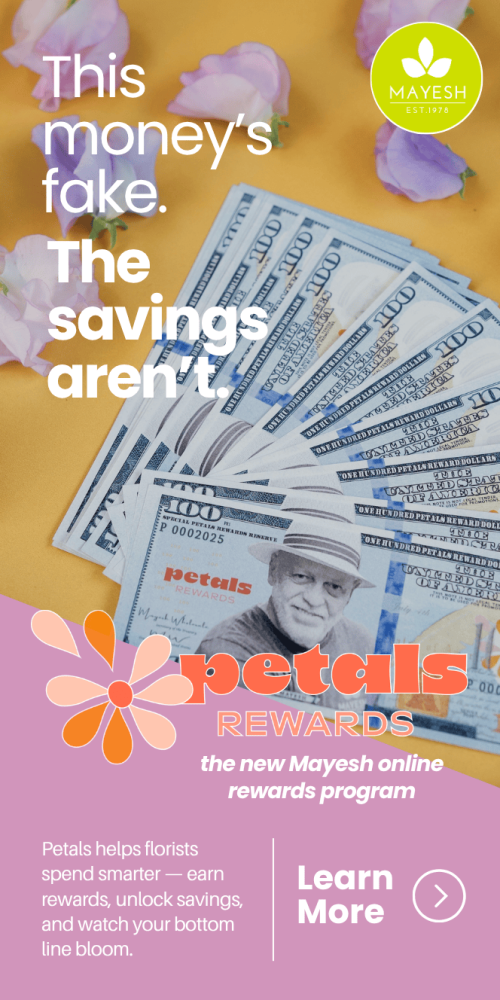
Covid Made Me Love My Business Again
Three florists share how the pandemic forced them to refocus their businesses—giving them a new lease on life in the process.
By Jennifer Howard
Event florists watched 2020’s cash flow fold like a house of cards as the world froze and held its collective breath. Owners sought to unload overhead, bailing out the ship by reducing staff, closing retail spaces, canceling large orders and eliminating storage rentals.
“I knew events had to come back,” says Lillian Wright, owner of Mimosa Floral Design Studio in Brooklyn, N.Y. “I thought if I could just keep my overhead low, to control the bleeding, I could hibernate long enough to wait for weddings to return.” In the interim, Wright, like others, turned to government loan programs and borrowed money, for the first time, to make ends meet. It was a novel and unwelcome adjustment.
But the sting came with an upside. The sudden severity of change in 2020’s business gave many owners pause, time to assess the psychological toll their businesses were taking on them.
“It was heartbreaking to cut staff during the COVID quarantine. These people were family. I felt responsible for them, for letting them down,” Wright confides. “I needed less emotional risk.”
“The volume and pace of weddings were exhausting me, and I didn’t really know it,” shares Michelle Jones, owner of Flowers by Michelle in Las Vegas, Nev. “You get emotionally involved with couples. It’s exhilarating but draining.”

UNEXPECTED OUTCOMES
The magnitude of restrictions was a productivity sucker punch, knocking down many small businesses. But the time on the mat led to two unexpected outcomes: an outpouring of support from customers and introspective time for owners to reassess their businesses— and their lives.
As businesses shuttered, communities flocked online and to phones, to check in on local businesses and offer their support. “There was such increased demand for flowers, partly for gifting and partly just to support local businesses,” reports Michaela Gosar, owner of Fleurelity in Alexandria, Va.
Jones experienced the same. “We had customers calling to check on us and to make sure we were going to make it through. It was so touching,” she notes.
The COVID quarantine also pared down personal consumption habits and illuminated the idea that less was, in fact, more. “I discovered that I could live quite well without the high business volume and with more personal time,” Wright informs. “I figured out that my take- home could actually stay about the same, with a lot less risk and fewer headaches. I don’t need to run the rat race.”
As morning dawns on post-pandemic optimism, business owners are rethinking what they want to walk back into. Will they return to business as usual and hammer the productivity pedal down? Or will they adopt the positive changes COVID forced upon them?
According to these three florists, they are reimagining their businesses to fit into their lives, not the other way around.

SCALING BACK
The smaller weddings and events of 2020 allowed florists to slow the hustle and reconnect with bridal customers. “We used to serve more than 100 weddings a year, sometimes 30 to 40 in a month,” Wright says. “But the more we did, the less I was gelling with customers. I lost the one-on-one connection with my clients, and I felt like I was just managing people. Our product could have been any widget, not the joy and beauty of flowers.”
Gosar feels similarly. “Smaller events allow me to provide more personalized service, with more attention to detail,” she assures. “It’s a difference that shines through in the quality of my customers’ experiences.”
Florists weren’t the only ones enjoying more intimate events. “Many brides wanted smaller weddings, but often their parents felt like they needed to invite everyone. COVID gave them permission to say no,” Wright points out. “These 20-to-50-person events have been some of the most heartfelt ceremonies I’ve seen. It’s so beautiful, with no pressure to impress or entertain.”


SPENDING TIME INTENTIONALLY
The restrictions of quarantine contrasted with an increase in personal free time. Many designers reported taking time to refuel their depleted creativity tanks by spending time in nature or by generally enjoying the time away. “I love hiking in nature and observing how nature creates shapes and pairs colors,” Jones shares. “It brings me renewed perspective to infuse into my designs.”
Some designers, even recovering wedding addicts, are reducing workloads and taking weekends off.
“We’re still doing a few weekends per month, just not the volume,” Jones reports. “I need to have that time for myself every once in a while.”
Gosar is focusing on customized individual arrangements and a limited palette of small events to mindfully control her time. “I do a few weddings, but, as a rule, I don’t work weekends,” she shares. “I want that time for my family.”
THROTTLING WORK
Designers are better controlling their calendars. “We’re definitely booking weddings,” Wright says. “They are 90 percent of our business. But now it’s only one large one per weekend. We’ve set a budget minimum and a maximum number of events we will serve.” Wright is also changing her online offerings to allow herself more creative freedom. “We used to offer a bunch of specific designs, but you get pigeonholed by the photos,” she remarks. “Now I offer arrangements based on budget, container and vibe. Customers can specify things like colors, size and energy level, and they know we’ll make it beautiful. It’s so much easier to meet expectations.”
INCORPORATING PERSONAL PASSIONS
Business owners are also tailoring business offerings to represent their values. “I am so passionate about the environment,” Gosar points out. “I think through how all my materials will be used, to try to limit waste—which also reduces my overhead. I don’t use any boxes or plastics, and I avoid floral foam whenever possible. I love using FloraGuppies for my arrangements instead of foam. They are biodegradable and reusable, and customers often return them to me to reuse.”
Jones loves providing personal service. She’s introduced live online shopping experiences where employees provide virtual tours for customers through the store to showcase products that interest them. It allows customers to enjoy the displays and merchandising as part of a custom experience, in addition to online shopping.
“We’re known for our great giftware. We carry things that are different from any big-box store. And we make our displays pretty. So, this is a way to connect with customers who might not be able to make it into the store.”
RECOMMITTING TO COMMUNITY
With so many consumers taking an interest in local floral businesses, owners are looking for ways to better serve their neighbors. “I started this business to bring flowers closer to all people,” Gosar explains. “I want to make what used to be a seasonal luxury to now be ‘everyday affordable’ for middle-class families around me.”
Wright uses her physical storefront in Brooklyn as a window into her studio’s creativity. “I call it ‘Flower Fridays,’” she notes. “I love to pick up unusual things at the flower market and experiment—just reconnect with flowers and create new combinations. It helps me meditate on new designs, and those arrangements become inventory for our Friday walk-in customers.”
So COVID’s unexpected injection into life has yielded valuable results. These business owners are finding ways to love their businesses and have personal lives at the same time. “It may not always be comfortable,” Jones offers. “But change is the best way to keep moving forward!”


Related Articles
Related
Retail Forecast 2026
By Phillip M. Perry Tapped out low- and middle-income shoppers, sluggish employment and lackluster housing turnover will challenge retailers in 2026. Helping to smooth things over will be robust buying by high-income consumers, lower interest rates and...
Build a Culture of Celebration
Energize your floral design team. Here’s how. By Jules Lewis Gibson In the fast-paced world of floristry—where early mornings, last-minute requests and endless creativity are part of the job—it’s easy to focus only on getting orders out the door. But do you take...
Arranging Your Future
The exit strategy every florist needs. By Kat Castagnoli, AIFD For many florists, retirement planning isn’t just low on the priority list—it often doesn’t exist at all. Long hours, tight margins and a culture that celebrates artistry over financial strategy make it...






















